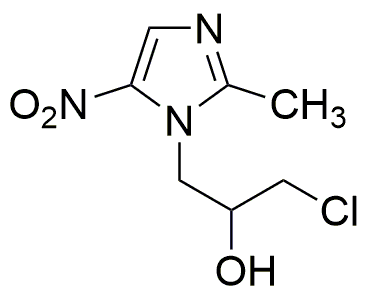Ornidazole is widely utilized in research focused on:
- Antimicrobial Treatments: It is primarily used in the treatment of various infections, particularly those caused by anaerobic bacteria and protozoa, making it valuable in both clinical and veterinary settings.
- Pharmaceutical Development: Researchers leverage its properties to develop new formulations and dosage forms, enhancing the efficacy of treatments for conditions like amoebiasis and giardiasis.
- Clinical Trials: Ornidazole is frequently involved in clinical studies assessing its effectiveness against resistant strains of pathogens, providing critical data for healthcare advancements.
- Combination Therapies: It is often used in combination with other antibiotics to broaden the spectrum of activity, which is particularly beneficial in treating polymicrobial infections.
- Research on Drug Resistance: The compound serves as a model in studies investigating mechanisms of drug resistance, helping to inform strategies for overcoming challenges in infectious disease management.
Informations générales
Propriétés
Sécurité et réglementation
Applications
Ornidazole is widely utilized in research focused on:
- Antimicrobial Treatments: It is primarily used in the treatment of various infections, particularly those caused by anaerobic bacteria and protozoa, making it valuable in both clinical and veterinary settings.
- Pharmaceutical Development: Researchers leverage its properties to develop new formulations and dosage forms, enhancing the efficacy of treatments for conditions like amoebiasis and giardiasis.
- Clinical Trials: Ornidazole is frequently involved in clinical studies assessing its effectiveness against resistant strains of pathogens, providing critical data for healthcare advancements.
- Combination Therapies: It is often used in combination with other antibiotics to broaden the spectrum of activity, which is particularly beneficial in treating polymicrobial infections.
- Research on Drug Resistance: The compound serves as a model in studies investigating mechanisms of drug resistance, helping to inform strategies for overcoming challenges in infectious disease management.
Documents
Fiches de données de sécurité (FDS)
La FDS fournit des informations de sécurité complètes sur la manipulation, le stockage et l’élimination du produit.
Spécifications du produit (PS)
Le PS fournit une description complète des propriétés du produit, notamment sa composition chimique, son état physique, sa pureté et les exigences de stockage. Il détaille également les plages de qualité acceptables et les applications prévues du produit.
Certificats d'analyse (COA)
Recherchez des certificats d'analyse (COA) en saisissant le numéro de lot du produit. Les numéros de lot et de lot se trouvent sur l'étiquette d'un produit, après les mots « Lot » ou « Lot de fabrication ».
Numéro de catalogue
Numéro de lot/série
Certificats d'origine (COO)
Ce certificat d'exploitation confirme le pays dans lequel le produit a été fabriqué, et détaille également les matériaux et composants utilisés et s'il est issu de sources naturelles, synthétiques ou autres sources spécifiques. Ce certificat peut être requis pour les douanes, le commerce et la conformité réglementaire.
Numéro de catalogue
Numéro de lot/série
Fiches de données de sécurité (FDS)
La FDS fournit des informations de sécurité complètes sur la manipulation, le stockage et l’élimination du produit.
DownloadSpécifications du produit (PS)
Le PS fournit une description complète des propriétés du produit, notamment sa composition chimique, son état physique, sa pureté et les exigences de stockage. Il détaille également les plages de qualité acceptables et les applications prévues du produit.
DownloadCertificats d'analyse (COA)
Recherchez des certificats d'analyse (COA) en saisissant le numéro de lot du produit. Les numéros de lot et de lot se trouvent sur l'étiquette d'un produit, après les mots « Lot » ou « Lot de fabrication ».
Numéro de catalogue
Numéro de lot/série
Certificats d'origine (COO)
Ce certificat d'exploitation confirme le pays dans lequel le produit a été fabriqué, et détaille également les matériaux et composants utilisés et s'il est issu de sources naturelles, synthétiques ou autres sources spécifiques. Ce certificat peut être requis pour les douanes, le commerce et la conformité réglementaire.


